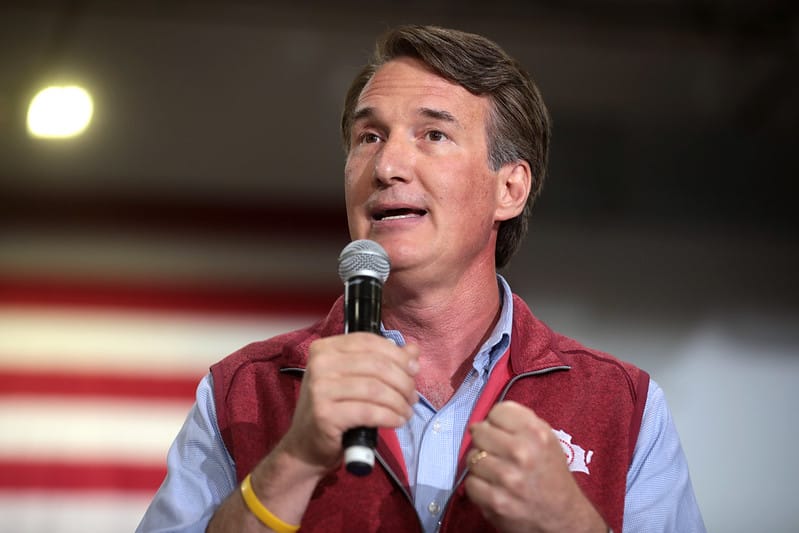Whether parents should have the power to shape their children’s education became a defining issue of Virginia’s gubernatorial race. Glenn Youngkin will soon have an opportunity and obligation to answer the concerns of the voting bloc that helped him become the commonwealth’s next governor.
While many political pundits have associated Virginia parents’ frustration with their children’s public schools with the ongoing culture war between right and left, many Virginia parents (including those who voted for Joe Biden 12 months ago) likely have more practical concerns. First, many of Virginia’s school districts were closed for long periods during the pandemic. Second, many parents (particularly those living near Washington) are paying high housing costs for public schools that aren’t providing a high-quality education.
According to Burbio, Virginia was among the states that offered the fewest days of in-person learning during the 2020-21 school year. Despite public health guidance from the American Academy of Pediatrics that it was safe to reopen schools in 2020, many of Virginia’s large school districts remained closed into the spring of 2021. That was long after teachers had been offered vaccines and many school districts across the country had reopened safely. These prolonged school closures harmed children and parents, particularly those from low-income households and children with disabilities.
Beyond the pandemic, the Washington, DC suburbs in Virginia have some of the highest housing costs in the United States. But as education scholar Matthew Ladner pointed out earlier this year, children in Arlington County learn “5.7 percent less each grade” than the U.S. average, according to the Stanford Educational Opportunity Project’s analysis of student testing growth. Children living in neighboring Alexandria learn 20 percent less than the national average. Virginia parents may be waking up to the idea that their high housing costs are not purchasing a high-quality education for their children.
Having won an election that became framed as a referendum on the role of parents in their children’s schooling, Governor-elect Youngkin will soon have a historic opportunity to improve learning opportunities for Virginia children.
For starters, Youngkin should use unspent federal emergency K-12 education relief aid to help children recover from learning losses caused by prolonged school closures during the pandemic.
According to the Department of Education, Virginia has $3 billion in unspent federal emergency K-12 education aid as of the start of the current school year. The commonwealth has spent less than 5 percent of its federal K-12 relief funds provided by Congress to help schools during the pandemic. Since schools are now reopened, it would be appropriate to provide much of that funding directly to the parents of disadvantaged children to recover from prolonged school closure .
For example, Ohio Governor Mike DeWine recently signed an executive order to establish an “after school emergency enrichment education savings account” using a share of the Buckeye state’s COVID k-12 relief funds. Under the plan, children from families with incomes below 300% of the poverty line will be eligible for enrichment ESAs worth $500 per year. Funds can be used for “various enrichment and educational activities, including tutoring, day camps, music lessons, study skill services, and field trips.” The program will cost $50 million during the first year and $75 million next year.
With $3 billion in federal aid unspent, Virginia could afford to provide generous enrichment or tutoring ESAs to help disadvantaged children address learning losses that occurred during the pandemic.
In the long-run, Virginia should enact a range of policies to give parents greater power to direct their children’s education. For example, the commonwealth has a weak charter school law and few students have the chance to attend these public schools of choice. Virginia has a small tax credit scholarship program, but only several thousand children benefit.
The incoming governor and lawmakers in Richmond should expand policies to help disadvantaged children and at-risk students, including those with special needs, benefit from greater parental choice. Broadly expanding choice within the public school system, including by enabling the creation of new public charter schools, is a good place to start.
But Youngkin and his team should think even bigger. For example, West Virginia recently created the nation’s most extensive K-12 education savings account program. Most parents will soon be able to access $4,600 per child to pay approved education costs, including tutoring, tuition, and special education services if they forgo enrolling in public schools. Creating a similar program in Virginia could offer unhappy parents with an affordable option outside of the public school system.
While it remains to be seen whether Virginia’s election will be a bellwether for other states and 2022, it’s reasonable to assume that many parents are paying closer attention to the K-12 education issue after the pandemic.
With a mandate for reform and the attention of the nation, Virginia’s next governor has a historic opportunity to give parents greater control over their children’s education. Parents and elected officials across the nation will surely be watching.

